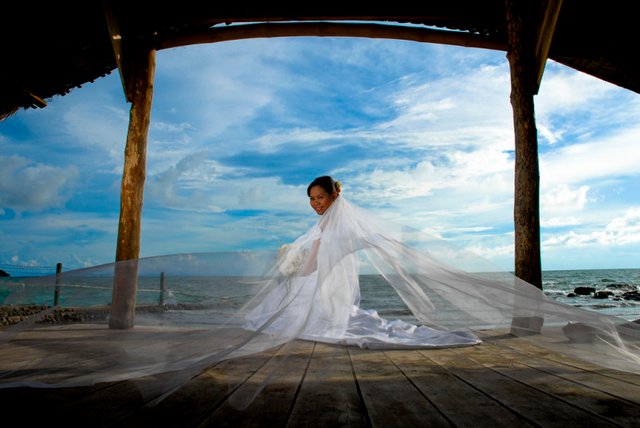Marriage, Traditions, & Superstitions of the Philippines

The Traditional Ways
The Philippine culture has very strict dating traditions. Both men and women need to follow traditional steps in which the man is the pursuer. Women should not show her interest and they should play hard to get as part of their tradition. This is a way for the man to show his interest in her.
The parent's approval is required in order for the man to be able to visit their daughter. After approval, the man visits the woman in the presence of the parents and they are to start talking with the man who is pursuing their daughter. This is very different from the way that things are done in the Western world. If a woman tries to invite a man over to his home when they are just starting to date, this can be seen as a desperate act and it rarely works. In the Philippines, this is a very important part of the old tradition.
As the Philippines has become more westernized, these traditions have also slowly vanished.
Marriage
Wedding traditions have been strongly influenced by the Catholic faith going back to the colonization by the Spanish. For 333 years the Spanish instituted law and order and the Catholic institution. It’s no surprise that 400 some years later those traditions and beliefs are still carried on today. Today the Philippines seems to follow the fads of the United States and the Western way of life, some of the marriage traditions are slowly evaporating over time and becoming a little more mainstream as time passes and they work themselves into the global stage.
Filipino marriage still remains largely a very committed and serious commitment. It’s one of the reasons foreign men tend to be attracted to Filipina woman, not to mention their natural beauty and sweet charming personalities as well. By law, and by the church, divorce is not an option in the Philippines. Filipina woman mostly, and I use the word mostly as there are some exceptions to the rule, that are extremely loving and faithful to their husband and family. Filipinas make wonderful wives and mothers by most standards today.
Traditionally, if a couple decides to get married, there are many important traditions that they should follow without skipping out on any of the details. The process of the wedding is an effort that is made by the community and everyone gets involved to help those who are getting married. The ceremony is held at the bride’s home and the community is the one in charge of providing the financial help to get the food and the required decorations for the wedding reception traditionally.
Traditions or Should we say “Superstitions”
The people of the Philippines are chocked full of superstitions. Weddings defiantly don’t elude the superstitious in the Philippines. The list below is a list of “traditions” or “superstitions.”
- Knives are a bad idea to bring to a Filipino Wedding!
There are certain traditions like never buying the groom and bride a set of knives because this is considered bad luck. While you are at it, forgo any sharp objects, such as a pair of scissors as well. We don’t want to wish any bad luck to the newly married couple!
- Filipinos like to have parties, including a 3-day long wedding!
The Filipinos start celebrating Christmas in like October every year, so it’s natural a wedding will be a big celebration as well. Traditionally, but not always, a Filipino wedding might last 3 days where all the family is brought in for the celebration, and we mean ALL. Matter of fact, they could meet a relative there they didn’t even know they were related to!
- Big Family
The Filipino culture as a whole is very communal. Blood and family are always first. This is prevalent in the weddings, sponsors are chosen by family and are usually close family members or close friends. The Western world equivalent to sponsors would be a best man and bridesmaid.
- Bloody wedding? What?
An odd tradition perhaps to an outsider, but the bride and groom might bring a Priest of the Catholic Church into their home for a blessing. This blessing involves the priest poking the bride and groom’s chest to catch some of the blood in a container as a religious superstition. The couple joins hands over the container.
- Groom should pay.
This seems to be in line with Western traditions, where the groom should pay for the wedding to prove his love and devotion to his bride. As a foreigner, you can expect this to be the case for sure.
- Let the candles burn.
A traditional Catholic ceremony has the sponsors light a candle on each side of the bride and groom. This is done in Western tradition within the Catholic faith as well. However, in Filipino tradition, it is said, if one of the candles burns out that the person next to that candle will die before the other.
- Pray for rain
The day I married my wife Jen, I asked her why she was looking into the sky praying. It was a beautiful sunny day, just how we pray for it to be here in the U.S. on our wedding day. You see here in the U.S. rain on your wedding day singles bad luck for marriage, however in the Philippines, the bride prays for rain, as it is seen as good luck. It’s one of the amazing things about marrying someone outside your own culture. I think the pray for sun worked for us, as we have been happily married now for 8 years!
- She won’t try on that dress …
The bride should not try on her dress before the wedding for nothing! It’s bad luck!
- Two become one.
An all common phrase you hear in the Western world is “two become one.” In the Philippines, they take it a step further by having the second set of sponsors wrap a rosary ( sometimes coins on a chain ) around the collars of both the bride and groom in a figure eight pattern. This solidifies the “two becoming one.”
- Don’t drop the …
Ring! If anyone drops the ring or veil, it is a sign of bad luck for the marriage. Don’t drop that ring!
- Brothers and sisters can’t get married.
Yes, that is a bit misleading, but we will explain. Brothers or sisters are not allowed to get married in the same year as one of their siblings. This holds true for both the bride and groom. One thing about the Philippine culture is each year holds an extreme value. It is common to hear, oh well maybe next year and next year will be better.
- It is still gentlemen like to ask her parents.
Out of respect for her and her family, the groom should make the journey to her home. He should bring his parents along or some members of his family, a gift of some sort and food, as a way of asking for permission. This also shows his devotion to her family.
Single life, the road less traveled in the Philippines …
The people who choose not to get married are often seen as outcasts and this pressure is meant to keep people on track with the traditional customs that allow for a stronger society. This conventional way of seeing marriage is extremely useful in most social environments and the married couple with children should be the backbone of that social structure.
Marriage is still a very big deal in the Philippines and there are very few people who choose to remain single when compared to other countries in the world. There are many traditions that are still quite important in the process of marriage in this particular country and they will probably remain relevant for a long time.
As times change so do many of the traditions in the Philippines.
Co-Authored by

Unfortunately, I think a lot of this is no longer followed. The Philippines of today is a lot different and heavily influenced by other cultures, especially the west. A lot of these traditions and beliefs are no longer followed or even known in today's filipino culture.
My wife is filipino as well and we currently live in the Philippines. It's a very different place now.
Youre right @wordtraveler, Im from philippines too. We can only see these things in books, although there are few who still followed it but majority were already influenced by the new generation.
I specifically asked my wife about some of these, and she says there are still some who follow some of the older traditions.
Yeah there is and its kind of good though at least filipino culture and tradition will still be observe and not be forgotten.
Yep, Im sure there are still families who observe old traditions, but unfortunately they are no longer the majority and probably more provincial. The rapid growth of the Philippines, especially in the cities have changed the culture dramatically. 9 out of 10 people that I have showed your post to have not heard of a majority or even all of the traditions mentioned above, with the 10th person only knowing about them because they read about it previously. I attend at least 1-2 weddings a month and the traditions you mention above do not exist. Sponsors are no longer just friends and family and in some cases include influential people and associates who can benefit the couple (and im not just speaking financially, but in experience as well - such as a couple who has been married for a long time who can provide guidance and advice.) Brides nowaday, would not be caught dead putting on a dress they have not tried on previously; and If your lucky, the wedding ceremony will last a few hours, because as soon as the meal is complete, most guests will start leaving, and this is only to name a few.
I'm not saying you are wrong or that what you say is not true. Im just saying that like most things in this world, times have changed and unfortunately traditions, superstitions, and beliefs such as the one's you have mentioned are only a memory in a vast part of the majority - and this of course is unfortunate.
I think we expressed what you are saying 3 or 4 times in the article.
Like any cultural traditions they change with the times. We decided to write a piece on some of the traditional aspects instead of the modern ones, and I thought we expressed that clearly in the article, or no?
And yes I would say asking people from the city vs province will have a huge impact on the kind of responses you get. Jenelyn is from the province (matag-ob, leyte to be precise) so our writings will almost always be based off those experiences and knowledge.
Worry not, Duterte will bring back the good times ;)
Duterte scares me a little bit :)
Yup you are correct, that is why I used the word traditions and traditional and emphized westernization in our post.
My wife is also Filipina, we will be going back in Feb.
Many of the superstitions are for sure still prevalent though, you would know that haha
Included in Steemprentice Spotlight 200+ member edition :)

Tweeted by SteemLand
Thankyou. Always nice to get an insight into another culture.
Thanks, at some point, if it is worth my time, I (fat-like-buddha) might write a very detailed post about being in an interracial marriage and meshing two cultures.
This post has been linked to from another place on Steem.
Learn more about linkback bot v0.4. Upvote if you want the bot to continue posting linkbacks for your posts. Flag if otherwise.
Built by @ontofractal
We love the Philippines
Your article reminded us of the month we spent in this wonderful country.
Thanks for the content of your post.
If you like, visit our blog where we shared our experience.
See you soon
Elisa & Luca